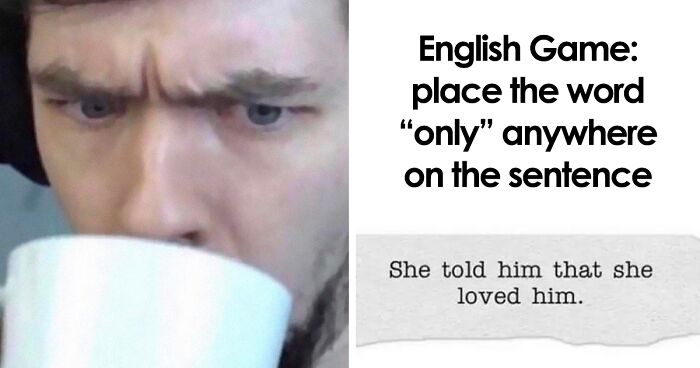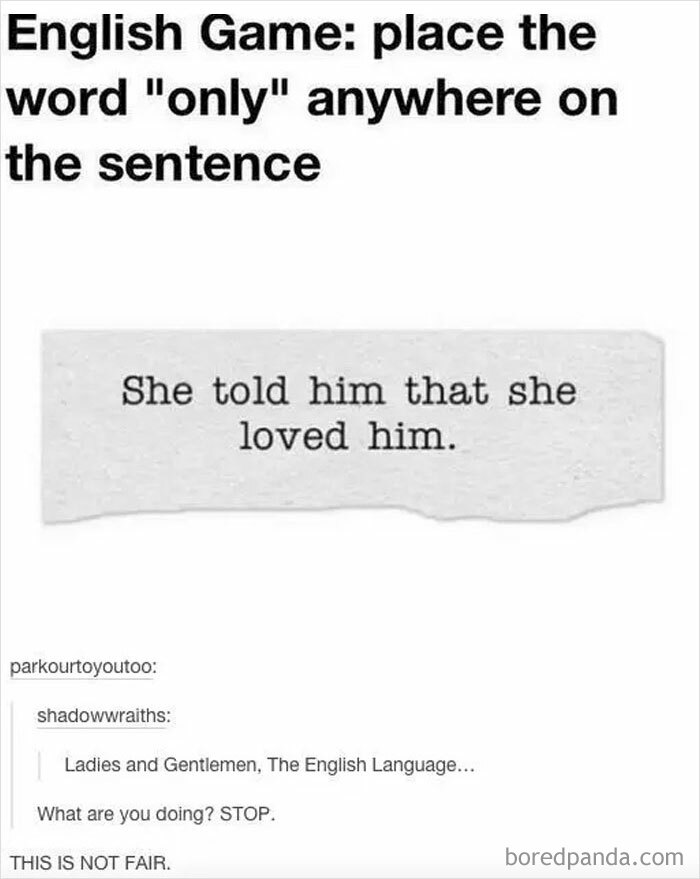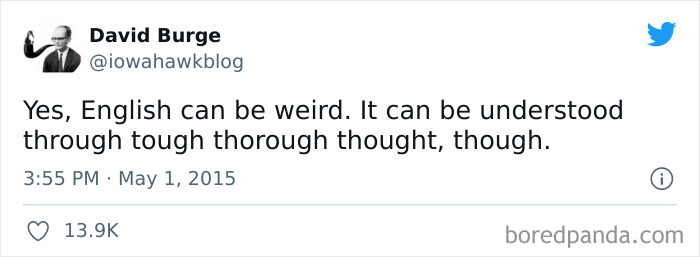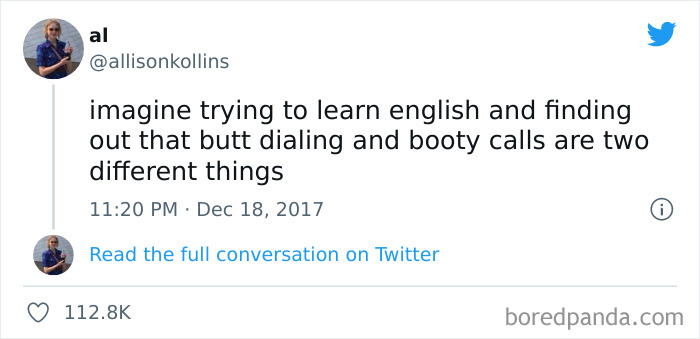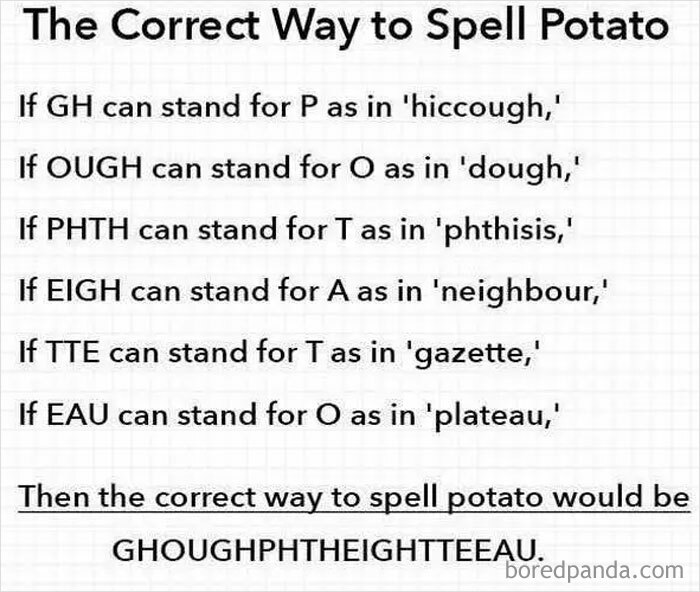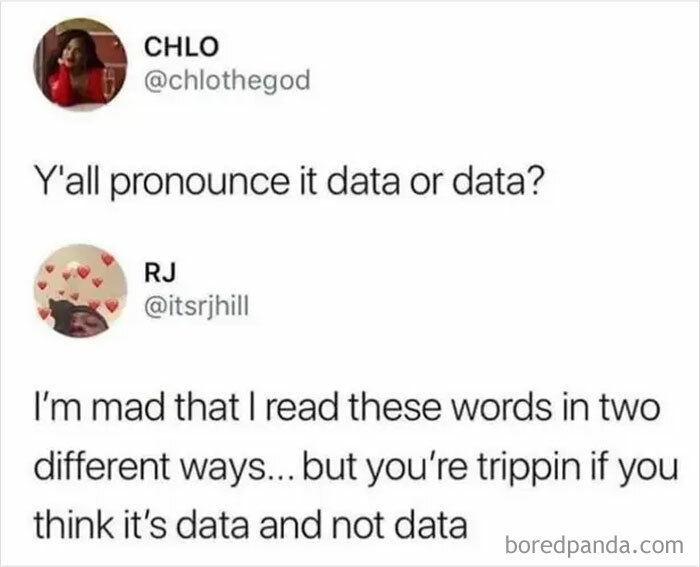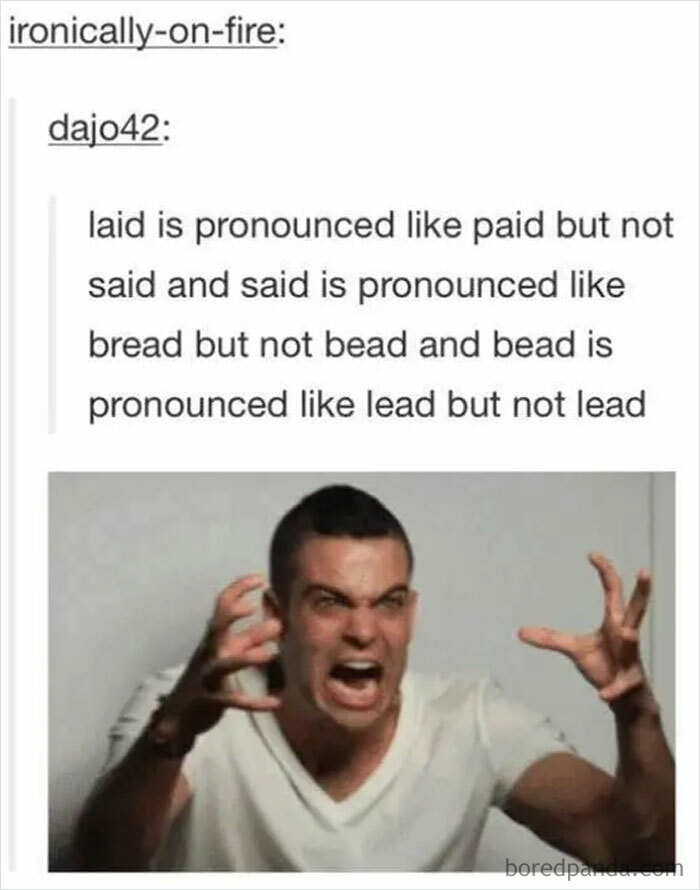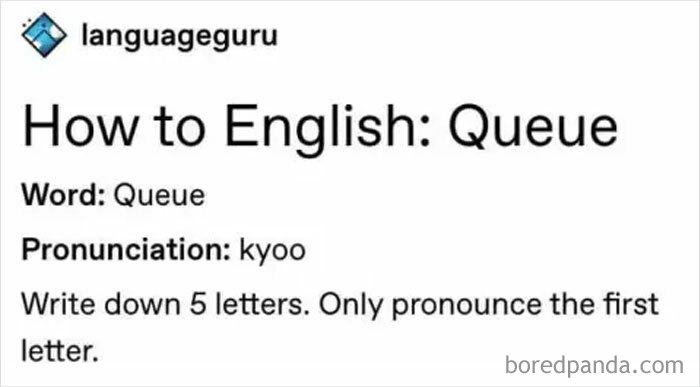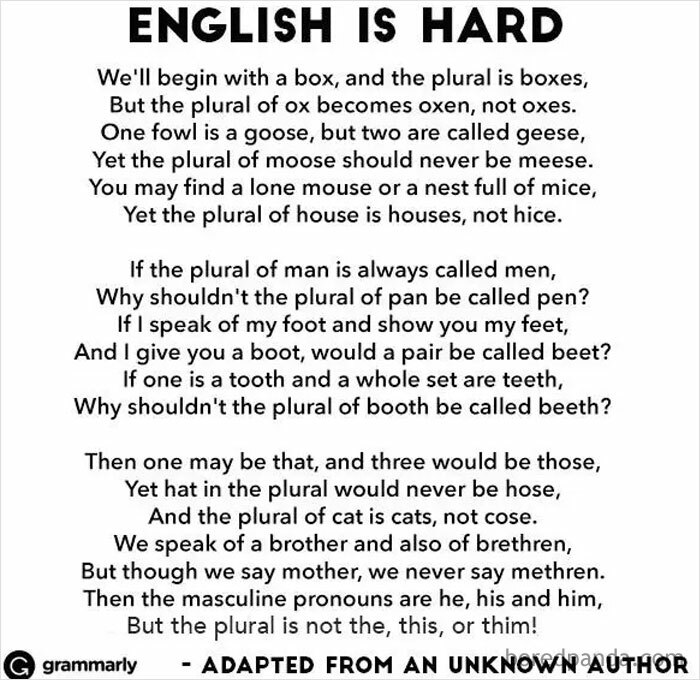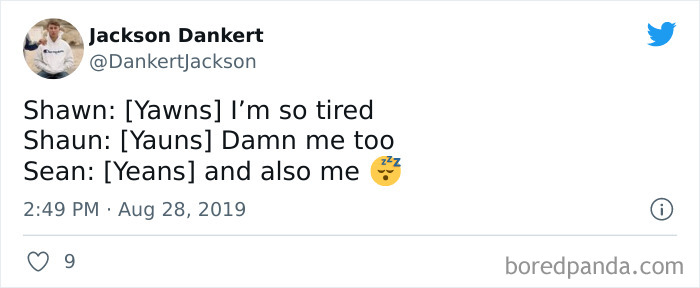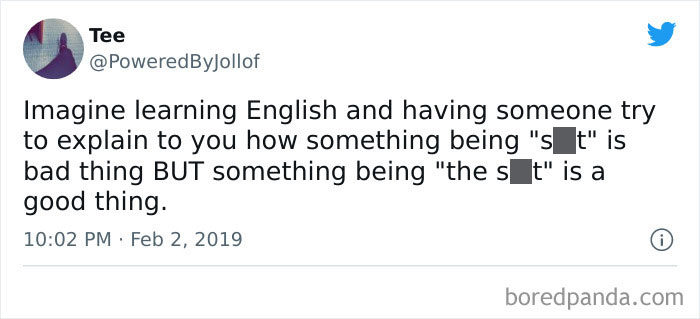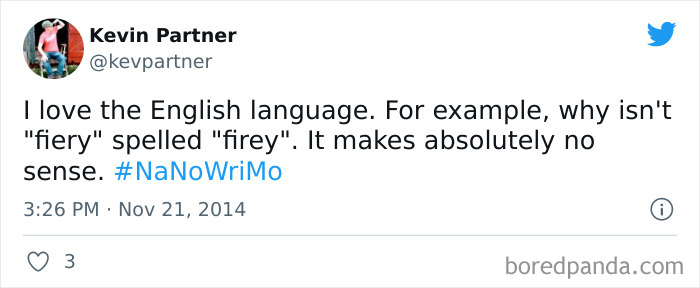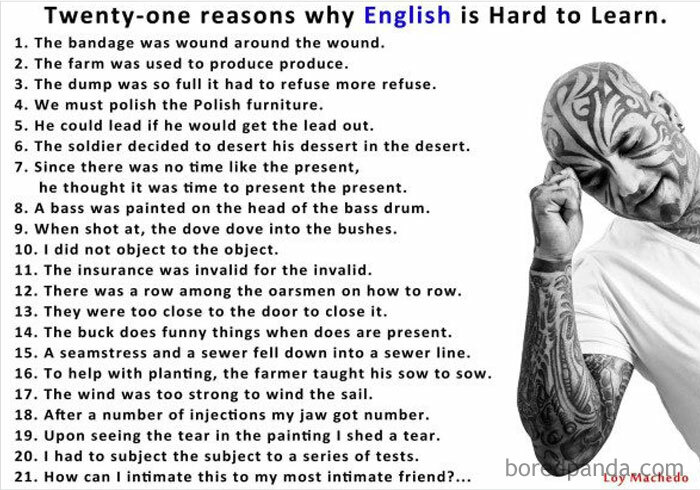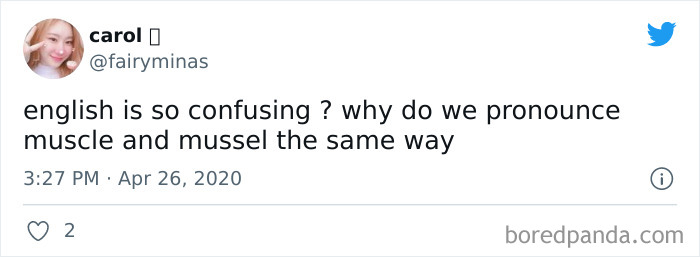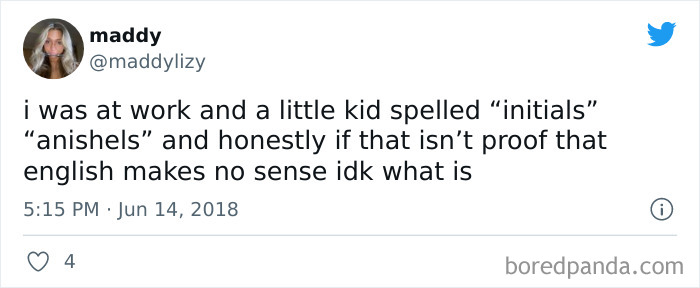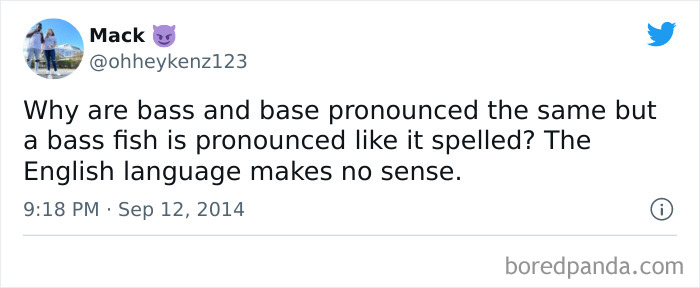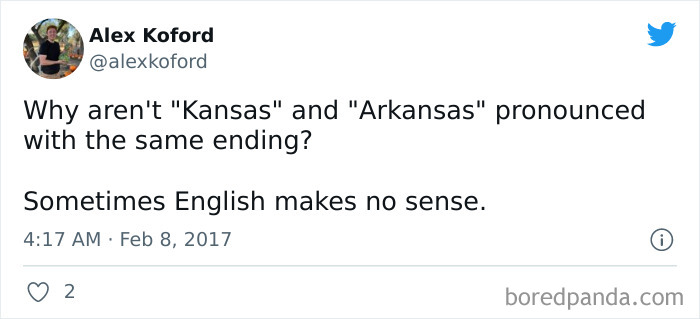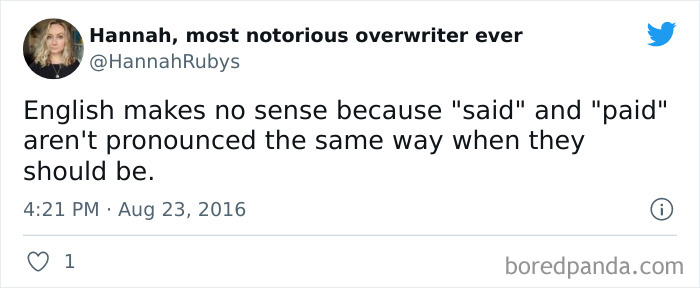English is the most spoken language in the world with a mind-bending total of 1.348 billion speakers. So no language like it has ever dominated the world. The influence of English can be easily traced in the way its vocabulary has infiltrated so many other languages.
Researchers at the IULM University in Milan have noticed that, in the past 50 years, Italian syntax has shifted towards patterns that mimic English models, and that’s just one example. And thanks to the global influence of social media, younger generations from around the world are all speaking fluent English, mimicking insta-famous natives from across the sea like it's no big deal.
So it’s only fair to expect something from this language, right? For example, that it makes sense, is user-friendly and somewhat intuitive. And it kinda is, or is it? Well, you gotta draw your own conclusions after scrolling through some of the weirdest, most frustrating and pretty incredible English language quirks we collected below. From the cursed English pronunciation to the sentences that have 7 or more different meanings depending on the stressed word, this is a crazy class you wouldn’t like to have an exam in.
This post may include affiliate links.
If the plural of goose is geese, should the plural of moose be meese?
English, the universal language of this world, is somewhat of a tough nut to crack for anyone who just got on board. The reason for this is the fact that this language is full of unique quirks and incredible oddities that, although challenging at first, give it character. For example, think of the sentence “I haven’t slept for ten days, because that would be too long” by Mitch Hedberg, who created this paraprosdokian, a phrase that figuratively defeats your expectation. The listener or reader will have to reframe or reinterpret the earlier clause. Coming from the Greek ‘para’ meaning ‘against’ and ‘prosdokia’ meaning ‘expectation,’ a paraprosdokian leaves the reader somewhat baffled by the conclusion of the sentence.
I didn't kill your dog. I DIDN'T kill your dog. I didn't KILL your dog. I didn't kill YOUR dog. I didn't kill your DOG.
Another confusing thing in the English language may be syntactic ambiguity. Here is an example: “I’m happy I’m a tennis player, and so is Albert.” It can mean four things: “I am happy Albert and I are both tennis players,” “I’m glad I'm a tennis player, and Albert is also a tennis player,” “Albert and I are both glad I’m a tennis player,” or “I am glad I’m a tennis player and Albert is also glad to be a tennis player.”
Both are rarely heard outside America except from people who think Americanisms are trendy.
Geronyms, brand names used to mean an everyday item, are also common in the English language. These terms have seeped into the general psyche and are used more often than their technical counterparts. We almost always ‘Google’ something instead of doing an ‘online search.’ In the US especially, for example, people often refer to cotton swabs as ‘Q-Tips’ after their brand name. Increasingly more popular nowadays is the process of ‘Photoshopping’ an image, after Adobe’s software of the same name.
Auto-antonyms are words with multiple meanings, two of which are antonyms of one another. Some are used in everyday language without our realizing it: the word ‘off’ is guilty of this. We can turn something off, meaning it will cease to be on. Conversely, the alarm can go off, meaning it has—rather bizarrely—just turned on. In more technical terms, a ‘strike’ can, in baseball terminology, mean a hit or a miss.
Easy. As an English/American native speaker go for german words like "Streichholzschachtel".
Also, if a person from Poland is a Pole, then shouldn't a person from Holland be a Hole?
The "if" throws me. "You all would have" all contract in previously accepted ways. Same with "I would have". I have never seen "if" contracted into anything before. It would have been recognisable as Y'all'd've if I'd've. (Because I'd also like to point out that the apostrophe around I'd was in the wrong place)
Kowtow is technically not an English word, its an anglicized version of a Chinese words.
Trying to teach my daughter to read and write is hard. She has to sound out her words when reading. But the sounds the words make are not the same as spelling them on paper. 🙃
Arkansas and Kansas didnt come from English. Arkansas is a French corruption of the pronunciation of a Quapaw word meaning "The Down River People" Kansas is named after the Kansa people. Almost all of the states names came from native words, or French or Spanish corruptions of those native words.
Ahaaaa.... and here I thought Arkansas was a superior grade of a Kansas. Like Archangel. ♡ (joke btw, just in case)
Load More Replies...Fun fact! It’s illegal to pronounce Arkansas wrong in Arkansas
These are both from unrelated Native American words right? These are not English.
Not sure they're unrelated. I think both may be related to a common word for "people." The difference is that Arkansas comes to us from French who always drop the final "s" and keep even stress on syllables.
Load More Replies...Why TF do we use certain letters in words at ALL if they are just silent?
Please don't mix English and American. They are two different languages.
im not american and i thought that arkansas was pronounced with the ending kansas 😅
bro Arkansas is communist Kansas (our-Kansas, get it?) ps: no offense to people from Kansas or Arkansas
"I" before "E" only applies to 45 words in the entirety of the English language . . . So why was this drilled into my head when I was a kid?? Edit: feel I need to clarify. I realize there are more words within this rule, but in my elementary school I had a teacher that was adamant about it only applying to 45 words . . . Yeah, that lady swore up and down she had an English major.
You understand that we Finns are just now laugingh on these "difficulties" :D
yeah but dude ... Finnish is super odd. I raise you: lentokonesuihkuturbiinimoottoriapumekaanikkoaliupseerioppilas
Load More Replies...It isn't, it just has many quirks that take some time getting used to.
Load More Replies...Okay now, try the declination by each of the 7 cases of Croatian and come back to me crying. ♡
Exactly. I did latin at school and it had six cases singular and six plural. Nightmare.
Load More Replies...The more other languages I learn, the more I love my native English. We're simple compared to some. No gendered nouns or articles, no cases for articles, ahhhh....
I also find that grammar mistakes in English can often be overlooked by the context. Getting grammar wrong in some languages seems to make you unintelligible
Load More Replies...In a nutshell, English is a hybrid of many languages, deriving from the Germanic group, but being influenced by Latin and French (as well as many others). This is why the spellings are a mess, but to learn as a beginner is very easy (I work, you work, she works, etc.) As it goes on it becomes harder and less rule-based. I'd like us to change some things about it (lose 'ough'), but it doesn't seem like it will ever happen.
we keep the "ough" to show the link to germanic origins. Compare these: durch (german): through (english). Though (english): Doch (german). Enough (English), Genug (German). Night (english): Nacht (German). Eight (english) : Acht (German). Etc.
Load More Replies...This is written by the people who never learned a foreign language and presumably think that those who learned English as a second language are some morons who would struggle to understand inconsistencies in grammar, spelling or pronunciation. Maybe learn another language first before showing your ignorance. Also the main difficulty for me personally and for many others who learned English late (I did it in my 20s) is the accent that can never be fully eliminated. Just doing this - learning how to accurately form sounds and adjust intonation using specialised textbooks - that is extremely hard and time consuming, and the most you can do is tone your accent down a bit to sound less annoying to the native speakers.
There is this weird myth going around native English speaker circles, that English is a hard to learn language, when the opposite is true.
Load More Replies...People, before you complain about english you might learn some german. We mix up our native language with lots of words from english and french, add some greek and latin and quiet some other languages and if you think you know how to spell one word we start adding grammar rules for the fun of it. And we love to use all types of articles (der, die das > the, the, the) but we didn't tell you why a "hammer" is masculin (der Hammer) but sometimes feminine (die Hammer, which is plural) and why cats are by default feminie (die Katze) but dogs aren't (der Hund). Well... as a native born german this all makes perfect sense to me and it's very funny to listen to people talking german but came from complete different cultural and lingual places (chinese often use different types of "symbols" so you need to think twice to understand them), but most people have quiet some struggle in understanding my natural language. :D
Dutch : "ogen" = "eyes", "blik"= "glance" so ogenblik means moment.
Just be glad English uses "the". No need to determine the gender of the noun, or the tense of the verb to choose a "the". eg: der, die das, dem, den, damn!
Looking at all of these complaints about English, I can only assume these people have little to no experience with any other language, either. Actually, on further consideration that would explain a great deal about a lot of the comments here.
English is a hybrid language made up from old Anglo Saxon (closest modern equivalent is Friesian), two different infusions of old French (Norman and Francien), some Latin, a bit of old Norse, and bits and pieces from other languages around the world thanks to the British Empire's reach. "The Adventure Of English" by Melvyn Bragg is a great book explaining how it all came together.
All this thread demonstrates is that a lot of people seemingly have no idea how the English language developed. A lot of false cognates on here. Words that "should" sound the same don't because they came to us via different routes. Understand the etmology and you'll understand the language. It's why UK schools (well, the decent ones) teach children Latin, and most undergraduate English language courses expect you to study Early English too.
It's not that surprising if you learn other languages. English is a combination of all the languages from people that once invaded them, and a handful of indigenous British languages. Once you realize England was colonized by others once, then you understand why English is so weird.
England was last colonized in 1066. In comparison, Spain had Arabic presence until 1492, was more or less part of Germany/Austria in the 16th century, and more lately was invaded by Napoleon, but still Spanish isn't remotely as weird as English.
Load More Replies...If only there was the pronounciation of all these words in these weird sentences. Sometimes I miss the point because I don't know the different pronunciations.
read/read. First one is "ri:d" - to read. Second one is "red" (to have read/considered some writing). Similar: lead/lead/led. First is "li:d" meaning to guide. The second is the metal plumbum, pronounced 'led'. The third is the past tense of lead (to guide). "Tear/Tear": one could be "ti:Ər" (meaning lacrima, results of to weep), the second one "tair" (to rip or shred). Then there's Tare, also "tair", meaning vehicle weight without load. J'espère que cela pourra aider.
Load More Replies...WHY TF IS “COLONEL” PRONOUNCED LIKE “KERNEL” IS WHAT I WANNA KNOW
Complaining about the dumb English spelling is so old hat, I'm tired of it. Some of the other comments were really interesting, but I stopped, not wanting to weed through people complaining that bomb and tomb don't rhyme. We had our chance to make the spelling phonetic and didn't take it. It's too late now. I wish Spanish was the most common language instead. It's very regular and the spelling is logical and phonetic. For the most part, if you know how to say it, you know how to spell it and vice versa.
Have you read The Chaos by Gerard Nolst Trenité? If you liked these irregularities in English language, you'll surely enjoy reading the poem from 1922!!
Science is the word that always gets me. i is before e even though it's after c and doesn't sound like a. You broke every exception to the rule at once.
So most of the confusions in the English language can be easily explained because they stole most words from other nations.
It's called "loanwords" and every language does that. People really need to stop calling this stealing, it's silly.
Load More Replies...Think about the poem "Chaos" by Gerard Nolst Trenité https://ncf.idallen.com/english.html
For a split second I thought I'd been mispronouncing 'minute' all this time ^^'
Load More Replies...Speaking (writing) as someone who IS English, I think the answer to the question 'why does the english language make no sense' is, in fact IN the question...xxx
English is my second language. I am really good when it comes to spelling and pronouncing. Grammar could use improvement, punctuation as well. My native language is Streichholzschachtel. I don't understand why so many people think German is hard to learn. For instance, everything is pronounced the way it is spelled. Makes life so much easier. And, after thirty years, I still hate gallons, inches, bushels, feet, ounces, miles, pounds ...
Invalid and invalid are spelled the same way but have very different meanings, Ore do they
Let's not forget that the "th" combination has two different pronunciations, voiced ("that," "there," "then") and unvoiced ("Throw three things Thursday, Martha"). Icelandic, for one, has two different letters for the two different sounds. Makes sense to me. A lot of the confusion, I think, comes from the fact that many pronunciations have evolved toward simplification but the spellings have stayed the same for centuries. We still spell it "knife," for example, but no longer pronounce it "kuh-niff-uh," like we used to. It's no wonder people get flummoxed.
Pretty sure there are no native English speaking words.. Just saying..
Is that Jacksepticeye with the coffee cup under the headline? It sure looks like him. And it sounds like something he would say.
But, it's probably that Alex G Karth, whoever that is.
Load More Replies...Gerard Nolst Trenité - The Chaos (1922) Dearest creature in creation Studying English pronunciation, I will teach you in my verse Sounds like corpse, corps, horse and worse. I will keep you, Susy, busy, Make your head with heat grow dizzy; Tear in eye, your dress you'll tear; Queer, fair seer, hear my prayer. Pray, console your loving poet, Make my coat look new, dear, sew it! Just compare heart, hear and heard, Dies and diet, lord and word. Sword and sward, retain and Britain (Mind the latter how it's written). Made has not the sound of bade, Say-said, pay-paid, laid but plaid. Now I surely will not plague you With such words as vague and ague, But be careful how you speak, Say: gush, bush, steak, streak, break, bleak , Previous, precious, fuchsia, via Recipe, pipe, studding-sail, choir; Woven, oven, how and low, Script, receipt, shoe, poem, toe. Say, expecting fraud and trickery: Daughter, laughter and Terpsichore, Branch, ranch, measles, topsails, aisles, Missiles, similes, reviles. Wholly, holly, signal, signing, Same, examining, but mining, Scholar, vicar, and cigar, Solar, mica, war and far. From "desire": desirable-admirable from "admire", Lumber, plumber, bier, but brier, Topsham, brougham, renown, but known, Knowledge, done, lone, gone, none, tone, One, anemone, Balmoral, Kitchen, lichen, laundry, laurel. Gertrude, German, wind and wind, Beau, kind, kindred, queue, mankind, Tortoise, turquoise, chamois-leather, Reading, Reading, heathen, heather. This phonetic labyrinth Gives moss, gross, brook, brooch, ninth, plinth. Have you ever yet endeavoured To pronounce revered and severed, Demon, lemon, ghoul, foul, soul, Peter, petrol and patrol? Billet does not end like ballet; Bouquet, wallet, mallet, chalet. Blood and flood are not like food, Nor is mould like should and would. Banquet is not nearly parquet, Which exactly rhymes with khaki. Discount, viscount, load and broad, Toward, to forward, to reward, Ricocheted and crocheting, croquet? Right! Your pronunciation's OK. Rounded, wounded, grieve and sieve, Friend and fiend, alive and live. Is your r correct in higher? Keats asserts it rhymes Thalia. Hugh, but hug, and hood, but hoot, Buoyant, minute, but minute. Say abscission with precision, Now: position and transition; Would it tally with my rhyme If I mentioned paradigm? Twopence, threepence, tease are easy, But cease, crease, grease and greasy? Cornice, nice, valise, revise, Rabies, but lullabies. Of such puzzling words as nauseous, Rhyming well with cautious, tortious, You'll envelop lists, I hope, In a linen envelope. Would you like some more? You'll have it! Affidavit, David, davit. To abjure, to perjure. Sheik Does not sound like Czech but ache. Liberty, library, heave and heaven, Rachel, loch, moustache, eleven. We say hallowed, but allowed, People, leopard, towed but vowed. Mark the difference, moreover, Between mover, plover, Dover. Leeches, breeches, wise, precise, Chalice, but police and lice, Camel, constable, unstable, Principle, disciple, label. Petal, penal, and canal, Wait, surmise, plait, promise, pal, Suit, suite, ruin. Circuit, conduit Rhyme with "shirk it" and "beyond it", But it is not hard to tell Why it's pall, mall, but Pall Mall. Muscle, muscular, gaol, iron, Timber, climber, bullion, lion, Worm and storm, chaise, chaos, chair, Senator, spectator, mayor, Ivy, privy, famous; clamour Has the a of drachm and hammer. Pussy, hussy and possess, Desert, but desert, address. Golf, wolf, countenance, lieutenants Hoist in lieu of flags left pennants. Courier, courtier, tomb, bomb, comb, Cow, but Cowper, some and home. "Solder, soldier! Blood is thicker", Quoth he, "than liqueur or liquor", Making, it is sad but true, In bravado, much ado. Stranger does not rhyme with anger, Neither does devour with clangour. Pilot, pivot, gaunt, but aunt, Font, front, wont, want, grand and grant. Arsenic, specific, scenic, Relic, rhetoric, hygienic. Gooseberry, goose, and close, but close, Paradise, rise, rose, and dose. Say inveigh, neigh, but inveigle, Make the latter rhyme with eagle. Mind! Meandering but mean, Valentine and magazine. And I bet you, dear, a penny, You say mani-(fold) like many, Which is wrong. Say rapier, pier, Tier (one who ties), but tier. Arch, archangel; pray, does erring Rhyme with herring or with stirring? Prison, bison, treasure trove, Treason, hover, cover, cove, Perseverance, severance. Ribald Rhymes (but piebald doesn't) with nibbled. Phaeton, paean, gnat, ghat, gnaw, Lien, psychic, shone, bone, pshaw. Don't be down, my own, but rough it, And distinguish buffet, buffet; Brood, stood, roof, rook, school, wool, boon, Worcester, Boleyn, to impugn. Say in sounds correct and sterling Hearse, hear, hearken, year and yearling. Evil, devil, mezzotint, Mind the z! (A gentle hint.) Now you need not pay attention To such sounds as I don't mention, Sounds like pores, pause, pours and paws, Rhyming with the pronoun yours; Nor are proper names included, Though I often heard, as you did, Funny rhymes to unicorn, Yes, you know them, Vaughan and Strachan. No, my maiden, coy and comely, I don't want to speak of Cholmondeley. No. Yet Froude compared with proud Is no better than McLeod. But mind trivial and vial, Tripod, menial, denial, Troll and trolley, realm and ream, Schedule, mischief, schism, and scheme. Argil, gill, Argyll, gill. Surely May be made to rhyme with Raleigh, But you're not supposed to say Piquet rhymes with sobriquet. Had this invalid invalid Worthless documents? How pallid, How uncouth he, couchant, looked, When for Portsmouth I had booked! Zeus, Thebes, Thales, Aphrodite, Paramour, enamoured, flighty, Episodes, antipodes, Acquiesce, and obsequies. Please don't monkey with the geyser, Don't peel 'taters with my razor, Rather say in accents pure: Nature, stature and mature. Pious, impious, limb, climb, glumly, Worsted, worsted, crumbly, dumbly, Conquer, conquest, vase, phase, fan, Wan, sedan and artisan. The th will surely trouble you More than r, ch or w. Say then these phonetic gems: Thomas, thyme, Theresa, Thames. Thompson, Chatham, Waltham, Streatham, There are more but I forget 'em- Wait! I've got it: Anthony, Lighten your anxiety. The archaic word albeit Does not rhyme with eight-you see it; With and forthwith, one has voice, One has not, you make your choice. Shoes, goes, does *. Now first say: finger; Then say: singer, ginger, linger. Real, zeal, mauve, gauze and gauge, Marriage, foliage, mirage, age, Hero, heron, query, very, Parry, tarry fury, bury, Dost, lost, post, and doth, cloth, loth, Job, Job, blossom, bosom, oath. Faugh, oppugnant, keen oppugners, Bowing, bowing, banjo-tuners Holm you know, but noes, canoes, Puisne, truism, use, to use? Though the difference seems little, We say actual, but victual, Seat, sweat, chaste, caste, Leigh, eight, height, Put, nut, granite, and unite. Reefer does not rhyme with deafer, Feoffer does, and zephyr, heifer. Dull, bull, Geoffrey, George, ate, late, Hint, pint, senate, but sedate. Gaelic, Arabic, pacific, Science, conscience, scientific; Tour, but our, dour, succour, four, Gas, alas, and Arkansas. Say manoeuvre, yacht and vomit, Next omit, which differs from it Bona fide, alibi Gyrate, dowry and awry. Sea, idea, guinea, area, Psalm, Maria, but malaria. Youth, south, southern, cleanse and clean, Doctrine, turpentine, marine. Compare alien with Italian, Dandelion with battalion, Rally with ally; yea, ye, Eye, I, ay, aye, whey, key, quay! Say aver, but ever, fever, Neither, leisure, skein, receiver. Never guess-it is not safe, We say calves, valves, half, but Ralf. Starry, granary, canary, Crevice, but device, and eyrie, Face, but preface, then grimace, Phlegm, phlegmatic, ass, glass, bass. Bass, large, target, gin, give, verging, Ought, oust, joust, and scour, but scourging; Ear, but earn; and ere and tear Do not rhyme with here but heir. Mind the o of off and often Which may be pronounced as orphan, With the sound of saw and sauce; Also soft, lost, cloth and cross. Pudding, puddle, putting. Putting? Yes: at golf it rhymes with shutting. Respite, spite, consent, resent. Liable, but Parliament. Seven is right, but so is even, Hyphen, roughen, nephew, Stephen, Monkey, donkey, clerk and jerk, Asp, grasp, wasp, demesne, cork, work. A of valour, vapid vapour, S of news (compare newspaper), G of gibbet, gibbon, gist, I of antichrist and grist, Differ like diverse and divers, Rivers, strivers, shivers, fivers. Once, but nonce, toll, doll, but roll, Polish, Polish, poll and poll. Pronunciation-think of Psyche!- Is a paling, stout and spiky. Won't it make you lose your wits Writing groats and saying "grits"? It's a dark abyss or tunnel Strewn with stones like rowlock, gunwale, Islington, and Isle of Wight, Housewife, verdict and indict. Don't you think so, reader, rather, Saying lather, bather, father? Finally, which rhymes with enough, Though, through, bough, cough, hough, sough, tough?? Hiccough has the sound of sup... My advice is: GIVE IT UP!😨😨😨
My mother never understood why Americans have spelling competitions - she does not speak English. English is not a language - it's a mixed bag of languages.
At least we only have genders for things that have genders, and ships.
And you can spell fish 'ghoti' gh as it is in enough. 'O' as it is in women, an 'ti' as it is in nation.
This rule has become a thorn in my side as I blame my public school education for not teaching me the WHOLE rule- I before E except after C, or when it sounds like an A such as in neighbor or weigh!!
difficult grammar, funny pronunciation, but at least it's consistent.
Load More Replies...I was today years old when I found out that my pronunciation is even worse than I thought. And I thought it was terrible. I'm French and I promise I'm never speaking again. 😂
Nah, they're exaggerating. I tell foreigners that the easiest way to simulate the right accent is to pronounce mostly the emphasised vowel and any long vowels. The short unemphasised vowels you just say as : Ə. For example, some of our fellow countrymen read "definitely" as "deaf fin nayt lee". Whereas it is "deaf fƏnƏt lee."
Load More Replies...as an English person I apologise, the problem is that the English language is a mixture of at least five other languages and at least one alien dialect. We also have regional dialects and words that are particular to certain parts of our country
My husband's ancestral homeland (just south of Birmingham) they used to say housen for the plural of house
Load More Replies...This is why I feel sorry for anyone learning English. I try extra hard not to lose patience cause English is hard enough for me and it's my 1st language. I guess that's one good thing about emojis, they're a mostly universal form of communication.
English is pretty easy to learn. The pronunciation can be little difficult, and for some languages there are some famous false friends, but grammar and vocabulary in general are not at all complicated.
Load More Replies...HELLO AM 48 YEAR MAN FROM SOMALIA. SORRY FOR BAD ENGLAND. I SELLED MY WIFE FOR INTERNET CONNECTION FOR PLAY "hearth stone" AND I WANT TO BECOME THE GOODEST PLAYER LIKE YOU I PLAY WITH 400 PING ON BRAZIL SERVER AND I AM RANK 23 ALREADY PLS NO COPY PASTE MY STORY
I read once that the English "language" started out as an immense practical joke on the rest of the world - except that nobody got the joke, and it was never called off.
"I" before "E" only applies to 45 words in the entirety of the English language . . . So why was this drilled into my head when I was a kid?? Edit: feel I need to clarify. I realize there are more words within this rule, but in my elementary school I had a teacher that was adamant about it only applying to 45 words . . . Yeah, that lady swore up and down she had an English major.
You understand that we Finns are just now laugingh on these "difficulties" :D
yeah but dude ... Finnish is super odd. I raise you: lentokonesuihkuturbiinimoottoriapumekaanikkoaliupseerioppilas
Load More Replies...It isn't, it just has many quirks that take some time getting used to.
Load More Replies...Okay now, try the declination by each of the 7 cases of Croatian and come back to me crying. ♡
Exactly. I did latin at school and it had six cases singular and six plural. Nightmare.
Load More Replies...The more other languages I learn, the more I love my native English. We're simple compared to some. No gendered nouns or articles, no cases for articles, ahhhh....
I also find that grammar mistakes in English can often be overlooked by the context. Getting grammar wrong in some languages seems to make you unintelligible
Load More Replies...In a nutshell, English is a hybrid of many languages, deriving from the Germanic group, but being influenced by Latin and French (as well as many others). This is why the spellings are a mess, but to learn as a beginner is very easy (I work, you work, she works, etc.) As it goes on it becomes harder and less rule-based. I'd like us to change some things about it (lose 'ough'), but it doesn't seem like it will ever happen.
we keep the "ough" to show the link to germanic origins. Compare these: durch (german): through (english). Though (english): Doch (german). Enough (English), Genug (German). Night (english): Nacht (German). Eight (english) : Acht (German). Etc.
Load More Replies...This is written by the people who never learned a foreign language and presumably think that those who learned English as a second language are some morons who would struggle to understand inconsistencies in grammar, spelling or pronunciation. Maybe learn another language first before showing your ignorance. Also the main difficulty for me personally and for many others who learned English late (I did it in my 20s) is the accent that can never be fully eliminated. Just doing this - learning how to accurately form sounds and adjust intonation using specialised textbooks - that is extremely hard and time consuming, and the most you can do is tone your accent down a bit to sound less annoying to the native speakers.
There is this weird myth going around native English speaker circles, that English is a hard to learn language, when the opposite is true.
Load More Replies...People, before you complain about english you might learn some german. We mix up our native language with lots of words from english and french, add some greek and latin and quiet some other languages and if you think you know how to spell one word we start adding grammar rules for the fun of it. And we love to use all types of articles (der, die das > the, the, the) but we didn't tell you why a "hammer" is masculin (der Hammer) but sometimes feminine (die Hammer, which is plural) and why cats are by default feminie (die Katze) but dogs aren't (der Hund). Well... as a native born german this all makes perfect sense to me and it's very funny to listen to people talking german but came from complete different cultural and lingual places (chinese often use different types of "symbols" so you need to think twice to understand them), but most people have quiet some struggle in understanding my natural language. :D
Dutch : "ogen" = "eyes", "blik"= "glance" so ogenblik means moment.
Just be glad English uses "the". No need to determine the gender of the noun, or the tense of the verb to choose a "the". eg: der, die das, dem, den, damn!
Looking at all of these complaints about English, I can only assume these people have little to no experience with any other language, either. Actually, on further consideration that would explain a great deal about a lot of the comments here.
English is a hybrid language made up from old Anglo Saxon (closest modern equivalent is Friesian), two different infusions of old French (Norman and Francien), some Latin, a bit of old Norse, and bits and pieces from other languages around the world thanks to the British Empire's reach. "The Adventure Of English" by Melvyn Bragg is a great book explaining how it all came together.
All this thread demonstrates is that a lot of people seemingly have no idea how the English language developed. A lot of false cognates on here. Words that "should" sound the same don't because they came to us via different routes. Understand the etmology and you'll understand the language. It's why UK schools (well, the decent ones) teach children Latin, and most undergraduate English language courses expect you to study Early English too.
It's not that surprising if you learn other languages. English is a combination of all the languages from people that once invaded them, and a handful of indigenous British languages. Once you realize England was colonized by others once, then you understand why English is so weird.
England was last colonized in 1066. In comparison, Spain had Arabic presence until 1492, was more or less part of Germany/Austria in the 16th century, and more lately was invaded by Napoleon, but still Spanish isn't remotely as weird as English.
Load More Replies...If only there was the pronounciation of all these words in these weird sentences. Sometimes I miss the point because I don't know the different pronunciations.
read/read. First one is "ri:d" - to read. Second one is "red" (to have read/considered some writing). Similar: lead/lead/led. First is "li:d" meaning to guide. The second is the metal plumbum, pronounced 'led'. The third is the past tense of lead (to guide). "Tear/Tear": one could be "ti:Ər" (meaning lacrima, results of to weep), the second one "tair" (to rip or shred). Then there's Tare, also "tair", meaning vehicle weight without load. J'espère que cela pourra aider.
Load More Replies...WHY TF IS “COLONEL” PRONOUNCED LIKE “KERNEL” IS WHAT I WANNA KNOW
Complaining about the dumb English spelling is so old hat, I'm tired of it. Some of the other comments were really interesting, but I stopped, not wanting to weed through people complaining that bomb and tomb don't rhyme. We had our chance to make the spelling phonetic and didn't take it. It's too late now. I wish Spanish was the most common language instead. It's very regular and the spelling is logical and phonetic. For the most part, if you know how to say it, you know how to spell it and vice versa.
Have you read The Chaos by Gerard Nolst Trenité? If you liked these irregularities in English language, you'll surely enjoy reading the poem from 1922!!
Science is the word that always gets me. i is before e even though it's after c and doesn't sound like a. You broke every exception to the rule at once.
So most of the confusions in the English language can be easily explained because they stole most words from other nations.
It's called "loanwords" and every language does that. People really need to stop calling this stealing, it's silly.
Load More Replies...Think about the poem "Chaos" by Gerard Nolst Trenité https://ncf.idallen.com/english.html
For a split second I thought I'd been mispronouncing 'minute' all this time ^^'
Load More Replies...Speaking (writing) as someone who IS English, I think the answer to the question 'why does the english language make no sense' is, in fact IN the question...xxx
English is my second language. I am really good when it comes to spelling and pronouncing. Grammar could use improvement, punctuation as well. My native language is Streichholzschachtel. I don't understand why so many people think German is hard to learn. For instance, everything is pronounced the way it is spelled. Makes life so much easier. And, after thirty years, I still hate gallons, inches, bushels, feet, ounces, miles, pounds ...
Invalid and invalid are spelled the same way but have very different meanings, Ore do they
Let's not forget that the "th" combination has two different pronunciations, voiced ("that," "there," "then") and unvoiced ("Throw three things Thursday, Martha"). Icelandic, for one, has two different letters for the two different sounds. Makes sense to me. A lot of the confusion, I think, comes from the fact that many pronunciations have evolved toward simplification but the spellings have stayed the same for centuries. We still spell it "knife," for example, but no longer pronounce it "kuh-niff-uh," like we used to. It's no wonder people get flummoxed.
Pretty sure there are no native English speaking words.. Just saying..
Is that Jacksepticeye with the coffee cup under the headline? It sure looks like him. And it sounds like something he would say.
But, it's probably that Alex G Karth, whoever that is.
Load More Replies...Gerard Nolst Trenité - The Chaos (1922) Dearest creature in creation Studying English pronunciation, I will teach you in my verse Sounds like corpse, corps, horse and worse. I will keep you, Susy, busy, Make your head with heat grow dizzy; Tear in eye, your dress you'll tear; Queer, fair seer, hear my prayer. Pray, console your loving poet, Make my coat look new, dear, sew it! Just compare heart, hear and heard, Dies and diet, lord and word. Sword and sward, retain and Britain (Mind the latter how it's written). Made has not the sound of bade, Say-said, pay-paid, laid but plaid. Now I surely will not plague you With such words as vague and ague, But be careful how you speak, Say: gush, bush, steak, streak, break, bleak , Previous, precious, fuchsia, via Recipe, pipe, studding-sail, choir; Woven, oven, how and low, Script, receipt, shoe, poem, toe. Say, expecting fraud and trickery: Daughter, laughter and Terpsichore, Branch, ranch, measles, topsails, aisles, Missiles, similes, reviles. Wholly, holly, signal, signing, Same, examining, but mining, Scholar, vicar, and cigar, Solar, mica, war and far. From "desire": desirable-admirable from "admire", Lumber, plumber, bier, but brier, Topsham, brougham, renown, but known, Knowledge, done, lone, gone, none, tone, One, anemone, Balmoral, Kitchen, lichen, laundry, laurel. Gertrude, German, wind and wind, Beau, kind, kindred, queue, mankind, Tortoise, turquoise, chamois-leather, Reading, Reading, heathen, heather. This phonetic labyrinth Gives moss, gross, brook, brooch, ninth, plinth. Have you ever yet endeavoured To pronounce revered and severed, Demon, lemon, ghoul, foul, soul, Peter, petrol and patrol? Billet does not end like ballet; Bouquet, wallet, mallet, chalet. Blood and flood are not like food, Nor is mould like should and would. Banquet is not nearly parquet, Which exactly rhymes with khaki. Discount, viscount, load and broad, Toward, to forward, to reward, Ricocheted and crocheting, croquet? Right! Your pronunciation's OK. Rounded, wounded, grieve and sieve, Friend and fiend, alive and live. Is your r correct in higher? Keats asserts it rhymes Thalia. Hugh, but hug, and hood, but hoot, Buoyant, minute, but minute. Say abscission with precision, Now: position and transition; Would it tally with my rhyme If I mentioned paradigm? Twopence, threepence, tease are easy, But cease, crease, grease and greasy? Cornice, nice, valise, revise, Rabies, but lullabies. Of such puzzling words as nauseous, Rhyming well with cautious, tortious, You'll envelop lists, I hope, In a linen envelope. Would you like some more? You'll have it! Affidavit, David, davit. To abjure, to perjure. Sheik Does not sound like Czech but ache. Liberty, library, heave and heaven, Rachel, loch, moustache, eleven. We say hallowed, but allowed, People, leopard, towed but vowed. Mark the difference, moreover, Between mover, plover, Dover. Leeches, breeches, wise, precise, Chalice, but police and lice, Camel, constable, unstable, Principle, disciple, label. Petal, penal, and canal, Wait, surmise, plait, promise, pal, Suit, suite, ruin. Circuit, conduit Rhyme with "shirk it" and "beyond it", But it is not hard to tell Why it's pall, mall, but Pall Mall. Muscle, muscular, gaol, iron, Timber, climber, bullion, lion, Worm and storm, chaise, chaos, chair, Senator, spectator, mayor, Ivy, privy, famous; clamour Has the a of drachm and hammer. Pussy, hussy and possess, Desert, but desert, address. Golf, wolf, countenance, lieutenants Hoist in lieu of flags left pennants. Courier, courtier, tomb, bomb, comb, Cow, but Cowper, some and home. "Solder, soldier! Blood is thicker", Quoth he, "than liqueur or liquor", Making, it is sad but true, In bravado, much ado. Stranger does not rhyme with anger, Neither does devour with clangour. Pilot, pivot, gaunt, but aunt, Font, front, wont, want, grand and grant. Arsenic, specific, scenic, Relic, rhetoric, hygienic. Gooseberry, goose, and close, but close, Paradise, rise, rose, and dose. Say inveigh, neigh, but inveigle, Make the latter rhyme with eagle. Mind! Meandering but mean, Valentine and magazine. And I bet you, dear, a penny, You say mani-(fold) like many, Which is wrong. Say rapier, pier, Tier (one who ties), but tier. Arch, archangel; pray, does erring Rhyme with herring or with stirring? Prison, bison, treasure trove, Treason, hover, cover, cove, Perseverance, severance. Ribald Rhymes (but piebald doesn't) with nibbled. Phaeton, paean, gnat, ghat, gnaw, Lien, psychic, shone, bone, pshaw. Don't be down, my own, but rough it, And distinguish buffet, buffet; Brood, stood, roof, rook, school, wool, boon, Worcester, Boleyn, to impugn. Say in sounds correct and sterling Hearse, hear, hearken, year and yearling. Evil, devil, mezzotint, Mind the z! (A gentle hint.) Now you need not pay attention To such sounds as I don't mention, Sounds like pores, pause, pours and paws, Rhyming with the pronoun yours; Nor are proper names included, Though I often heard, as you did, Funny rhymes to unicorn, Yes, you know them, Vaughan and Strachan. No, my maiden, coy and comely, I don't want to speak of Cholmondeley. No. Yet Froude compared with proud Is no better than McLeod. But mind trivial and vial, Tripod, menial, denial, Troll and trolley, realm and ream, Schedule, mischief, schism, and scheme. Argil, gill, Argyll, gill. Surely May be made to rhyme with Raleigh, But you're not supposed to say Piquet rhymes with sobriquet. Had this invalid invalid Worthless documents? How pallid, How uncouth he, couchant, looked, When for Portsmouth I had booked! Zeus, Thebes, Thales, Aphrodite, Paramour, enamoured, flighty, Episodes, antipodes, Acquiesce, and obsequies. Please don't monkey with the geyser, Don't peel 'taters with my razor, Rather say in accents pure: Nature, stature and mature. Pious, impious, limb, climb, glumly, Worsted, worsted, crumbly, dumbly, Conquer, conquest, vase, phase, fan, Wan, sedan and artisan. The th will surely trouble you More than r, ch or w. Say then these phonetic gems: Thomas, thyme, Theresa, Thames. Thompson, Chatham, Waltham, Streatham, There are more but I forget 'em- Wait! I've got it: Anthony, Lighten your anxiety. The archaic word albeit Does not rhyme with eight-you see it; With and forthwith, one has voice, One has not, you make your choice. Shoes, goes, does *. Now first say: finger; Then say: singer, ginger, linger. Real, zeal, mauve, gauze and gauge, Marriage, foliage, mirage, age, Hero, heron, query, very, Parry, tarry fury, bury, Dost, lost, post, and doth, cloth, loth, Job, Job, blossom, bosom, oath. Faugh, oppugnant, keen oppugners, Bowing, bowing, banjo-tuners Holm you know, but noes, canoes, Puisne, truism, use, to use? Though the difference seems little, We say actual, but victual, Seat, sweat, chaste, caste, Leigh, eight, height, Put, nut, granite, and unite. Reefer does not rhyme with deafer, Feoffer does, and zephyr, heifer. Dull, bull, Geoffrey, George, ate, late, Hint, pint, senate, but sedate. Gaelic, Arabic, pacific, Science, conscience, scientific; Tour, but our, dour, succour, four, Gas, alas, and Arkansas. Say manoeuvre, yacht and vomit, Next omit, which differs from it Bona fide, alibi Gyrate, dowry and awry. Sea, idea, guinea, area, Psalm, Maria, but malaria. Youth, south, southern, cleanse and clean, Doctrine, turpentine, marine. Compare alien with Italian, Dandelion with battalion, Rally with ally; yea, ye, Eye, I, ay, aye, whey, key, quay! Say aver, but ever, fever, Neither, leisure, skein, receiver. Never guess-it is not safe, We say calves, valves, half, but Ralf. Starry, granary, canary, Crevice, but device, and eyrie, Face, but preface, then grimace, Phlegm, phlegmatic, ass, glass, bass. Bass, large, target, gin, give, verging, Ought, oust, joust, and scour, but scourging; Ear, but earn; and ere and tear Do not rhyme with here but heir. Mind the o of off and often Which may be pronounced as orphan, With the sound of saw and sauce; Also soft, lost, cloth and cross. Pudding, puddle, putting. Putting? Yes: at golf it rhymes with shutting. Respite, spite, consent, resent. Liable, but Parliament. Seven is right, but so is even, Hyphen, roughen, nephew, Stephen, Monkey, donkey, clerk and jerk, Asp, grasp, wasp, demesne, cork, work. A of valour, vapid vapour, S of news (compare newspaper), G of gibbet, gibbon, gist, I of antichrist and grist, Differ like diverse and divers, Rivers, strivers, shivers, fivers. Once, but nonce, toll, doll, but roll, Polish, Polish, poll and poll. Pronunciation-think of Psyche!- Is a paling, stout and spiky. Won't it make you lose your wits Writing groats and saying "grits"? It's a dark abyss or tunnel Strewn with stones like rowlock, gunwale, Islington, and Isle of Wight, Housewife, verdict and indict. Don't you think so, reader, rather, Saying lather, bather, father? Finally, which rhymes with enough, Though, through, bough, cough, hough, sough, tough?? Hiccough has the sound of sup... My advice is: GIVE IT UP!😨😨😨
My mother never understood why Americans have spelling competitions - she does not speak English. English is not a language - it's a mixed bag of languages.
At least we only have genders for things that have genders, and ships.
And you can spell fish 'ghoti' gh as it is in enough. 'O' as it is in women, an 'ti' as it is in nation.
This rule has become a thorn in my side as I blame my public school education for not teaching me the WHOLE rule- I before E except after C, or when it sounds like an A such as in neighbor or weigh!!
difficult grammar, funny pronunciation, but at least it's consistent.
Load More Replies...I was today years old when I found out that my pronunciation is even worse than I thought. And I thought it was terrible. I'm French and I promise I'm never speaking again. 😂
Nah, they're exaggerating. I tell foreigners that the easiest way to simulate the right accent is to pronounce mostly the emphasised vowel and any long vowels. The short unemphasised vowels you just say as : Ə. For example, some of our fellow countrymen read "definitely" as "deaf fin nayt lee". Whereas it is "deaf fƏnƏt lee."
Load More Replies...as an English person I apologise, the problem is that the English language is a mixture of at least five other languages and at least one alien dialect. We also have regional dialects and words that are particular to certain parts of our country
My husband's ancestral homeland (just south of Birmingham) they used to say housen for the plural of house
Load More Replies...This is why I feel sorry for anyone learning English. I try extra hard not to lose patience cause English is hard enough for me and it's my 1st language. I guess that's one good thing about emojis, they're a mostly universal form of communication.
English is pretty easy to learn. The pronunciation can be little difficult, and for some languages there are some famous false friends, but grammar and vocabulary in general are not at all complicated.
Load More Replies...HELLO AM 48 YEAR MAN FROM SOMALIA. SORRY FOR BAD ENGLAND. I SELLED MY WIFE FOR INTERNET CONNECTION FOR PLAY "hearth stone" AND I WANT TO BECOME THE GOODEST PLAYER LIKE YOU I PLAY WITH 400 PING ON BRAZIL SERVER AND I AM RANK 23 ALREADY PLS NO COPY PASTE MY STORY
I read once that the English "language" started out as an immense practical joke on the rest of the world - except that nobody got the joke, and it was never called off.

 Dark Mode
Dark Mode  No fees, cancel anytime
No fees, cancel anytime 




